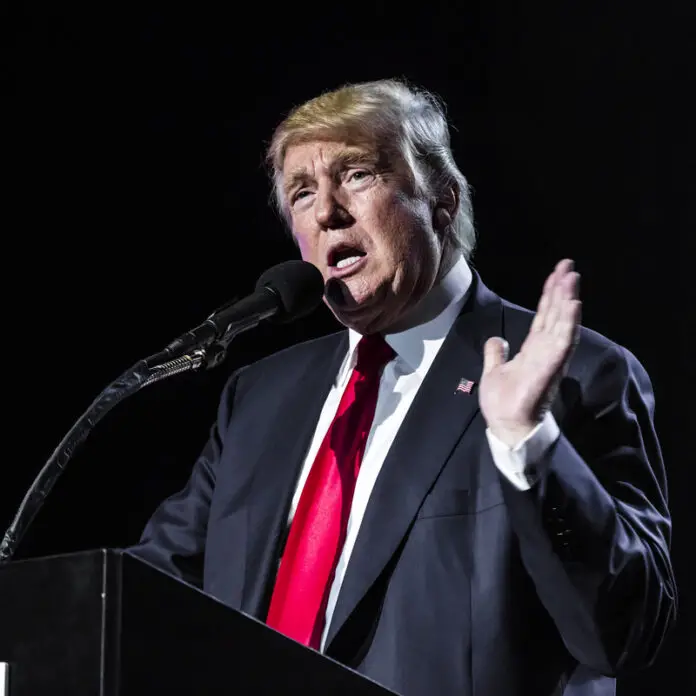President Donald Trump intensified his criticism of various media personalities and outlets this week, directing his ire at figures ranging from ABC News hosts to editors at Time magazine. This series of public statements underscores his ongoing friction with the press.
On Tuesday, October 14, Trump delivered particularly sharp criticism toward Alyssa Farah, a former White House Communications Director who is now a co-host on ABC’s The View. He accused her of not fulfilling a televised promise. Speaking to reporters, Trump called Farah “a joke” and described The View as “a fraud” after she failed to wear a MAGA hat, despite her January promise to do so if he secured a Gaza peace deal.
Trump highlighted Farah’s previous commitment to don a MAGA hat if he successfully negotiated the release of Israeli hostages, which he claimed to have achieved through the recent Gaza ceasefire agreement. He suggested Farah never anticipated having to honor her promise and implied her critical views of him shifted once ABC employed her.
The president further alleged that Farah had previously sent him a complimentary letter praising his first-term presidency. Trump concluded by asserting he has been called “the greatest president of them all,” a compliment he claimed surpassed anything Farah offered.
Trump’s media critiques extended to print publications as well. In an early morning post on his social media platform on Tuesday, he criticized Time magazine for what he deemed a “super bad” cover photo, calling it “the worst of all time.”
He specifically took issue with the upward angle of the photograph, which created an unusual lighting effect on his head. Trump complained that the editors made his hair appear to disappear, resulting in something resembling a floating crown. He questioned the magazine’s motives for choosing such an angle and speculated about their intentions.
The Time cover accompanied an article titled “How the Trump Administration Sealed the Gaza Ceasefire Deal,” which the president reluctantly acknowledged as relatively positive coverage of his diplomatic achievement. The article commended Trump for brokering the deal that secured the release of Israeli hostages and established a ceasefire in Gaza, describing it as a potential signature achievement and strategic turning point for the Middle East.
Trump’s critique of Time followed his return from a Middle East trip, where he celebrated the release of 20 hostages, delivered a speech to the Israeli parliament, and met with global leaders at a summit focused on ceasefire details and Gaza reconstruction plans.
The president’s confrontational stance toward media criticism has also influenced his administration’s responses to political adversaries. On Tuesday, October 14, the White House reacted sharply to Minnesota Governor Tim Walz’s criticism of Trump’s trade policies during a Democratic National Committee press call.
White House spokesperson Kush Desai dismissed Walz as an “imbecilic buffoon” after the governor criticized Trump’s tariffs on China during the press call. Walz argued that Trump’s trade war was harming American farmers by causing China to halt purchases of American soybeans and shift to suppliers like Brazil and Argentina.
The governor specifically criticized Trump for prioritizing what he referred to as a ridiculous trade war over the interests of American farmers. Walz noted that China had signed long-term contracts with other countries, making it challenging for American farmers to regain those markets. He emphasized that it had taken decades to establish these trading relationships and would require years to recover them.
Desai defended the administration’s trade and tariff policies, arguing that Trump’s approach was resetting decades of policies that favored other nations at the expense of American industry and communities. He claimed these policies addressed how American farmers had been unfairly excluded from foreign markets.
Trump’s confrontations with the media have also attracted criticism from editorial boards, with The Wall Street Journal publishing an editorial titled “Donald Trump and Letitia James, Lawfare Pals.” The editorial criticized both the president and New York Attorney General Letitia James for their legal disputes, describing them as “madness” and warning against “mutual assured legal destruction.”
These recent incidents continue Trump’s pattern of directly challenging media coverage and political opponents through public statements and social media, maintaining his combative approach toward press relations that characterized his first presidency.

